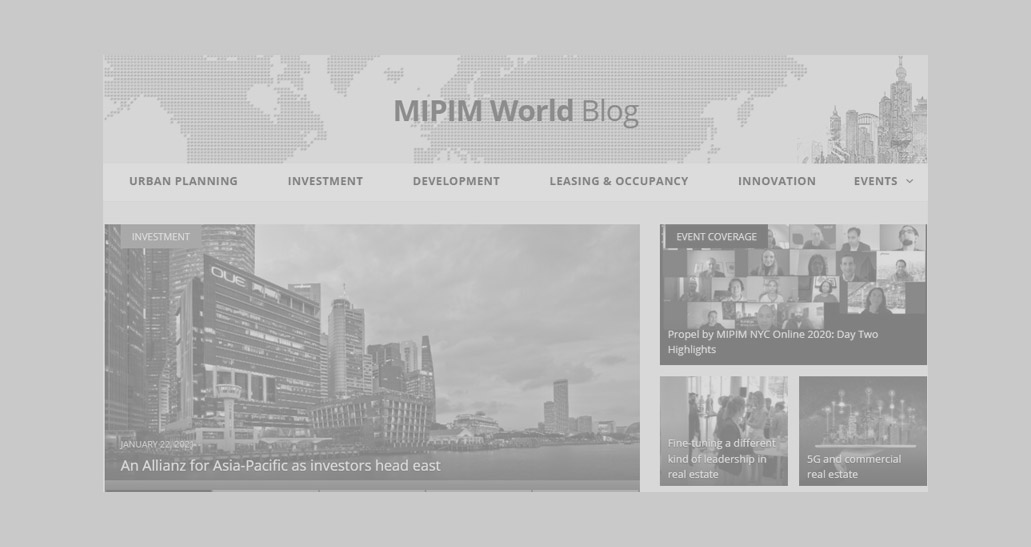PropTech today can mean the difference between success and failure in the real estate industry, with the pandemic exacerbating both types of outcome, participants heard on Day Two of Propel by MIPIM – NYC.
In his keynote speech, Aamir Paul, US Country President, Schneider Electric, said:
“Digital readiness has been an incredible differentiator in the health crisis. Operators in buildings that were digitally prepared have fared much better than the ones that were playing catch up.”
He added: “The best time to prepare for a crisis is before you find yourself in one.”

A discussion between private equity giant Blackstone and real estate deal management platform Dealpath underlined how the right technology can add the X-factor to existing processes. Said Mike Sroka, CEO & Co-Founder Dealpath:
“We saw a gap in the market for a tool which specifically enabled pipeline tracking, other tools weren’t purpose built in that way. The best operators are leveraging technology to succeed in the exciting world of real estate today.”

Sonya Huffman, COO Blackstone‘s Industrial Platform, explained how the software had proved a game-changer across the board: « Our initial goal was to develop a database, but then we realized we could apply its findings throughout our business. Within Dealpath, we have a lot of legacy information that we can apply going forward. »
Another exemplary case study came with the presentation of the digital-first partnership between VTS and real-time data tool RXR. In conversation with Nick Romito, Founder & CEO VTS, Scott Rechler Chairman & CEO RXR Realty, said:
“Covid has definitely been the accelerant of our digital transition. We were building the foundation as Covid hit, and were then able to roll out the underlying infrastructure that enables us to digitize our buildings in this ten-month period, to ultimately bring people back to the workplace. »
Romito said: “The sentiment of this industry for a long time was that digital takes away from ‘what I’m good at’ – the in-person experience. A great digital approach can actually enhance the overall experience.”
In another best-practice session, Thornton Tomasetti presented two start-ups, Konstru and T2D2, developed by its technology accelerator TWiiN, to tackle pain points within the construction industry.

Meanwhile, a session on sustainable innovation moderated by the NLA (New London Architecture)’s Program Director Amy Till looked at harnessing PropTech in the race to meet green targets. Till outlined:
“London has committed to being carbon neutral by 2050. NLA research found that policy and regulation is seen as the biggest barrier – and is currently not fit for purpose to reach targets. Lack of green finance is also a problem.”

Yet, there is light at the end of the tunnel, noted Will Cavendish, Global Digital Service Leader Arup.
“What is unappreciated is the role that tech and digital can play in this initiative – like using AI to solve problems such as reducing the embodied carbon in the design of new buildings,” he said.
However, Sonal Jain, Sustainability Director – Net Zero Carbon, Clients & Workplaces, JLL, suggested that the private sector would still need to be incentivized to fully get on board.
Despite the optimistic mood of Day Two, there was also time to discuss obstacles and areas for improvement across the industry. A compelling session tackling diversity looked at how far PropTech and real estate have come in matters of inclusivity – and how much is still to be done.
Craig Robinson, Board Director of Roofstock, questioned the logic of the slow pace of change: “Innovation is not happening in places where everyone round the table looks the same and comes from the same experiences. So, diversity is something that people should be embracing, not being dragged to do reluctantly,” he said.

Lauren Weston, Investment Associate at Thomvest Ventures, joined the dots between technology and diversity: “When I think about why diversity and technology are important at the moment, it’s because the consumer’s changing. Gen Z and Gen Y will soon become the largest demographic in this country – Gen Z are digital natives. We need diverse perspectives because they are key stakeholders in the value chain.”
Afternoon sessions addressed best-practice benchmarks around the world, including the Covid response from two major Canadian cities. Mike Williams of the City of Toronto said: « As part of Toronto’s Covid response, we’ve launched 25+ innovation programs; 35+ group mentoring sessions & a business support center; created a chatbot with almost 8000 Q&As; issued reopening guidelines and webinars.”

Added Daniel Mathieu of the City of Montreal: “We’re making up for the decrease in private investment by accelerating Montreal’s public sector infrastructure program. From transport and mobility, through housing and accommodation, to the water network and culture.”
Another session compared smart city developments in Brussels and Montreal. Noah Redler, Co-founder of Montreal’s Smart City Experience, suggested:
“Digitizing operations and cities has to have a human-centric focus. Beyond the idea of smart cities, we are now talking about intuitive and empathic buildings that can also self-manage.”

Added Idriss Goosens, Founder of Brussels’ PropTech Lab:
“We help a number of larger real estate firms create a vision of innovation for major projects, but regulation sometimes gets in the way. It’s crucial to create an agile regulatory framework and the idea of the interoperability of cities is exciting.”
Networking opportunities came in the shape of the Flash Talk Zone, the Occupiers’ Summit and Meet the Expert sessions focusing on the UK and the US. And, following on from the pre-Propel Leaders’ Perspectives series of webinars, Charlie Hobey, MD of Product and Operations, EQ Office and Raj Bhatti, Chief Information Officer, Newmark, got together to discuss life after Covid.

Said Hobey: “There’s not a silver bullet solution for companies in terms of the back to the office question. We’re constantly thinking about how our spaces can add value to our customers; we’re trying to stay as close to them as possible. Very few have nailed that hybrid model to date. »
The day finished in thrilling fashion with the Startup Competition – NYC Stop, backed by global partner Union Investment. Aaron Block, Managing Partner of MetaProp, was Master of Ceremonies as the jury selected winners in four categories.
Judges included Ginny Miller, VP Technology and Innovation, Jamestown Properties; Ryan J. S. Baxter, PropTech Advisor, NYSERDA; Vivin Hegde, Director, Tech Office, Hilti Group; and Mark E. Rose, Chairman & CEO, Avison Young.
The roll call of victors saw DrizzleX pick up the Sustainability prize; Equisafe win in the Investment category; Urban Ground GmbH win for User Experience; while StratoDem Analytics collected the Data award. These four winners now go forward to the grand finale at MIPIM in Cannes next year.




